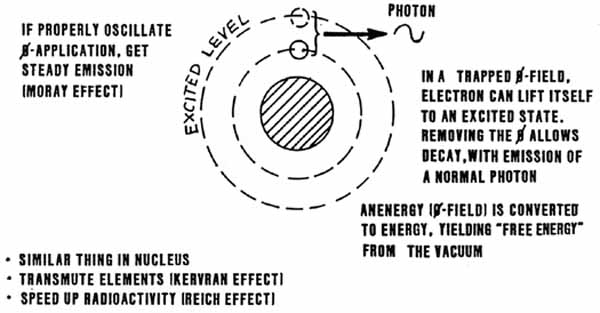|
Here we show one way to
provide a one-way gate valve from a del-phi river to energy released into the
outside world.
By providing a properly tuned,
oscillating phi wave, one can cause an orbital electron in an atom to raise
itself to an excited state. Remember, in a del-phi, an electron that hooks to it raises itself.
We then switch out the phi application, and the excited electron decays in normal
fashion, emitting a normal photon of energy.
By phase locking the
processes, one produces a steady stream of photons.
By absorbing or directing the
photons, one can produce heat, light, energy beams, etc.
By this means, one produces free energy by gating anenergy into energy.
And if one does not release spray
nozzles in the phi-oscillations which feed the mechanism, one has an inexhaustible energy production.
A very similar thing can be done with the excited states of the nucleus.
For example, by using a radioactive material with a predisposition to emit some particle
-- say an electron -- the nucleus can be made to continually emit the particles WITHOUT ITSELF
DECAYING INTO BYPRODUCTS. In other words, an electron is lifted from the Dirac sea of vacuum to instantly replace the electron emitted from the nucleus.
This provides a one-way gate valve from the Dirac sea to the external universe.
Theoretically,
these mechanisms are no more mysterious than a hydraulic ram, which raises water higher than the stream that feeds the ram.
In the 20's and 30's, T. Henry Moray
successfully built such gating devices for converting vacuum anenergy to external energy.
In the Kervran effect, living systems are able to directly
transmute elements, even though they only possess feeble energies, by influencing the virtual
particle interactions in the nucleus that furnish its binding energy.
Reich used an adaptation of a
cloudbuster
-- which emits scalar waves -- to drastically speed up radioactive decay of radioelements.
Both plants and
animals transmute elements by similar processes.
Next Slide
|

